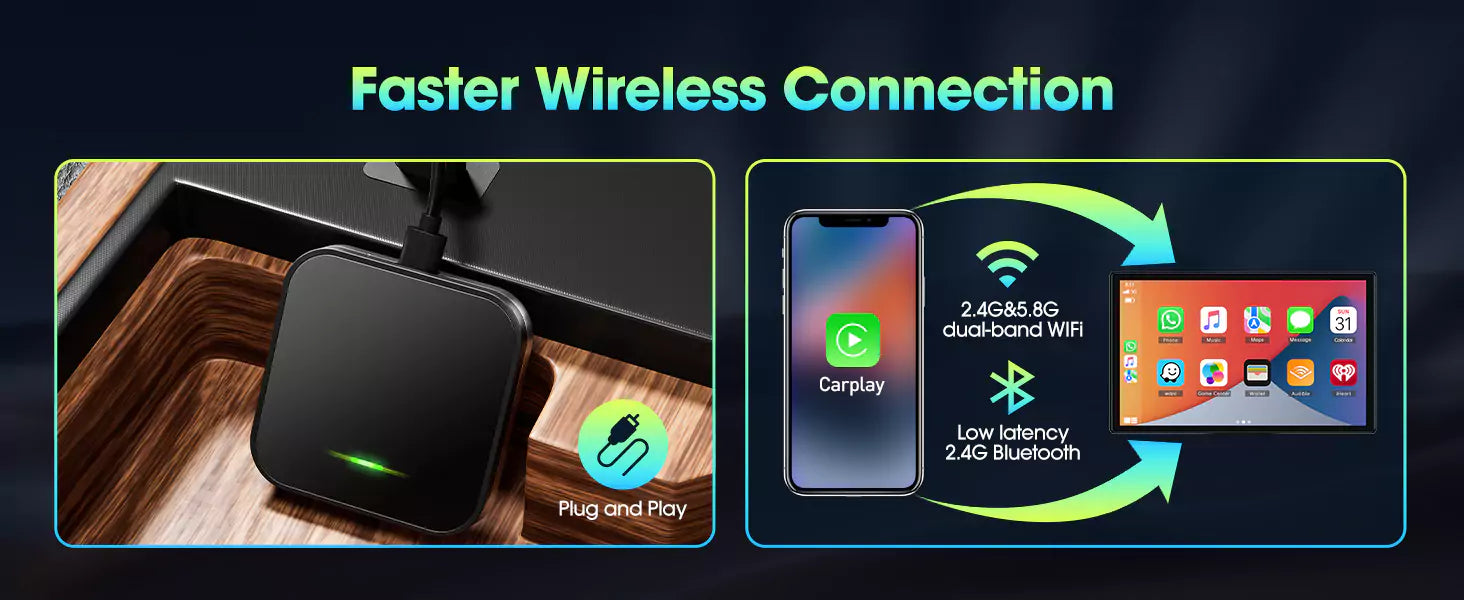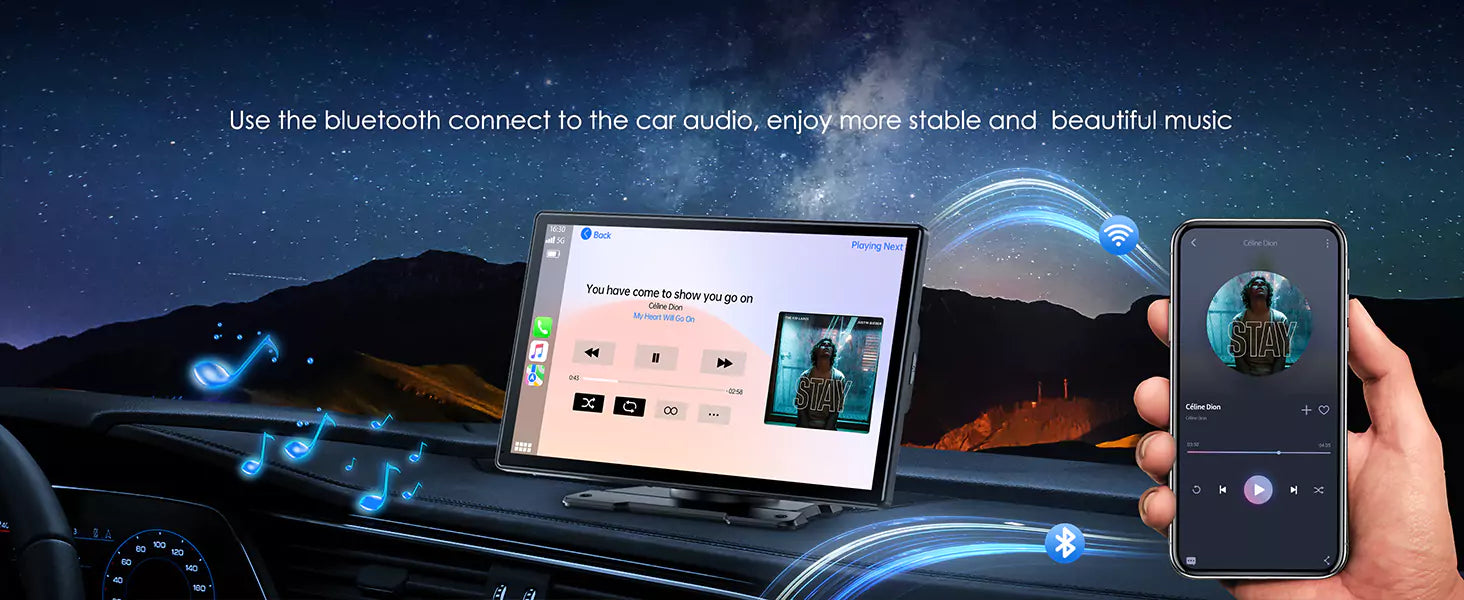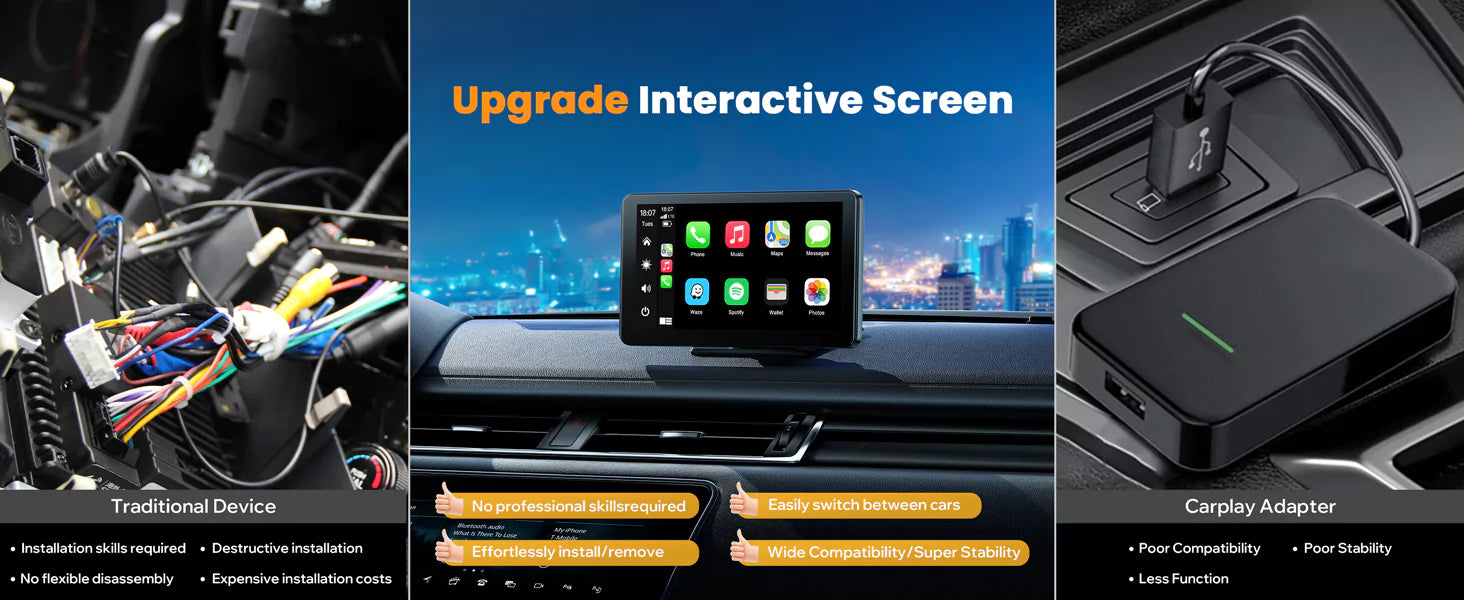A CarPlay wireless adapter is a device that enables you to convert a standard Apple CarPlay system, which typically requires a USB cable connection, into a system that can connect to your iPhone wirelessly. This is particularly useful for people who want to use their CarPlay-enabled infotainment system without the inconvenience of plugging in their phones every time they get in the car.

How CarPlay wireless adapter works?
Compatibility: First, ensure your vehicle's infotainment system supports Apple CarPlay with a USB connection.
Connection: The wireless adapter is plugged into the USB port that is normally used for CarPlay in the car.
Setup: You might need to go through a one-time setup process to pair the adapter with your iPhone. This usually involves connecting your phone to the adapter's own Wi-Fi network and then pairing it via Bluetooth.
Functionality: Once set up, the adapter communicates with your iPhone using Wi-Fi for CarPlay functionality and Bluetooth for the initial connection/link. When you start your vehicle, the adapter automatically connects to your phone, enabling the CarPlay interface to start up wirelessly on your infotainment system's screen.
Power: The adapter is typically powered through the USB port it is plugged into, so no additional power source is necessary.
Convenrence: With a wireless adapter, you can leave your iPhone in your pocket or bag, and it will connect to CarPlay as soon as you turn on your car, offering a seamless and convenient experience.
These adapters can be particularly useful for users who frequent short trips and find it cumbersome to connect and disconnect their phone repeatedly. They can usually be purchased online, and it's important to check the compatibility with your vehicle's make, model, and year to ensure proper functionality.

Is Wireless Carplay Worth It
Whether wireless CarPlay is worth it depends on your specific needs, preferences, and the value you place on the convenience it offers. Here are some points to consider when deciding if a wireless CarPlay solution is right for you:
Pros of Wireless CarPlay
- Convenience: Wireless CarPlay is extremely convenient as it eliminates the need to take your phone out and connect it to a USB cable every time you get into your car.
- Reduced Wear and Tear: Constantly plugging and unplugging a cable can wear out both the cable and the phone's port over time. Wireless connectivity avoids this issue.
- Clutter-Free: It helps keep the dashboard area free of cables, creating a cleaner look and reducing potential distractions.
- Multiple Users: It's easier to switch between different drivers' iPhones, as there's no need to physically plug in a different device.
- Battery Charging Options: You can still choose to plug your phone into a separate charger if needed, without affecting the CarPlay connection.
Cons of Wireless CarPlay
- Cost: Wireless CarPlay adapters can be an additional expense, and built-in wireless CarPlay options are typically found in higher-end vehicles or trim levels.
- Battery Usage: Using wireless CarPlay can drain your iPhone's battery faster, especially on longer trips where it might be more convenient to have the phone plugged in and charging.
- Potential Connectivity Issues: Some users report less stable connections with wireless CarPlay, experiencing occasional disconnections or lag, although this can vary based on the adapter and phone model.
- Setup Complexity: Setting up a wireless connection can sometimes be more complex than simply plugging in a cable, especially the first time or when pairing a new device.
Neutral Considerations
- Audio Quality: There generally shouldn't be a noticeable difference in audio quality between wired and wireless CarPlay.
- Functionality: The features and apps available through CarPlay are the same whether you're connected wirelessly or wired.
Ultimately, the decision will be influenced by how much the convenience of wireless connectivity is worth to you compared to the cost and any potential downsides. If you find that plugging in your phone isn't much of a hassle, or if you prefer to have your phone charging while driving, the wired connection might be satisfactory. However, if you want the latest technology and prefer the ease of just getting in your car and having everything connect automatically, then wireless CarPlay could be a worthwhile investment.

How does wireless carplay adapter work?
Wireless CarPlay adapters function by emulating a USB connection and establishing a Wi-Fi and Bluetooth connection with your iPhone. Here's a step-by-step explanation of how these adapters typically work:
Initial Connection
You plug the wireless CarPlay adapter into the car's USB port, which is the same port you would normally use for a wired CarPlay connection.
The adapter powers on when the car is started, entering its boot sequence.
Bluetooth Pairing
Upon first setup, you pair your iPhone with the adapter via Bluetooth. This is usually done through the Bluetooth settings on your iPhone, where the adapter will appear as a new device.
The Bluetooth connection is mainly used for the initial handshake between the phone and the adapter.

Wi-Fi Connection
After the initial Bluetooth pairing, the adapter sets up a Wi-Fi network that your iPhone will connect to.
The CarPlay data is transmitted over this Wi-Fi connection, which has higher bandwidth than Bluetooth and can handle the amount of data transmitted by CarPlay.
Emulating a Wired Connection
The adapter tricks the car's infotainment system into thinking the iPhone is connected via a USB cable, allowing the CarPlay interface to be displayed on the car's screen.
Automatic Reconnection
Once the initial setup is completed, the adapter should automatically reconnect to your iPhone each time you start your vehicle, re-establishing the Wi-Fi connection for CarPlay.
CarPlay Usage
You can then use Apple CarPlay as you normally would, accessing your music, navigation, messages, and other compatible apps wirelessly on your car's display.
It's important to note that not all wireless CarPlay adapters are created equal. They vary in terms of compatibility with different car models, setup complexity, connection stability, and overall performance. Always check the specifications and reviews before purchasing an adapter to ensure it meets your expectations and is compatible with your vehicle's make and model.




Leave a comment
All comments are moderated before being published.
This site is protected by hCaptcha and the hCaptcha Privacy Policy and Terms of Service apply.